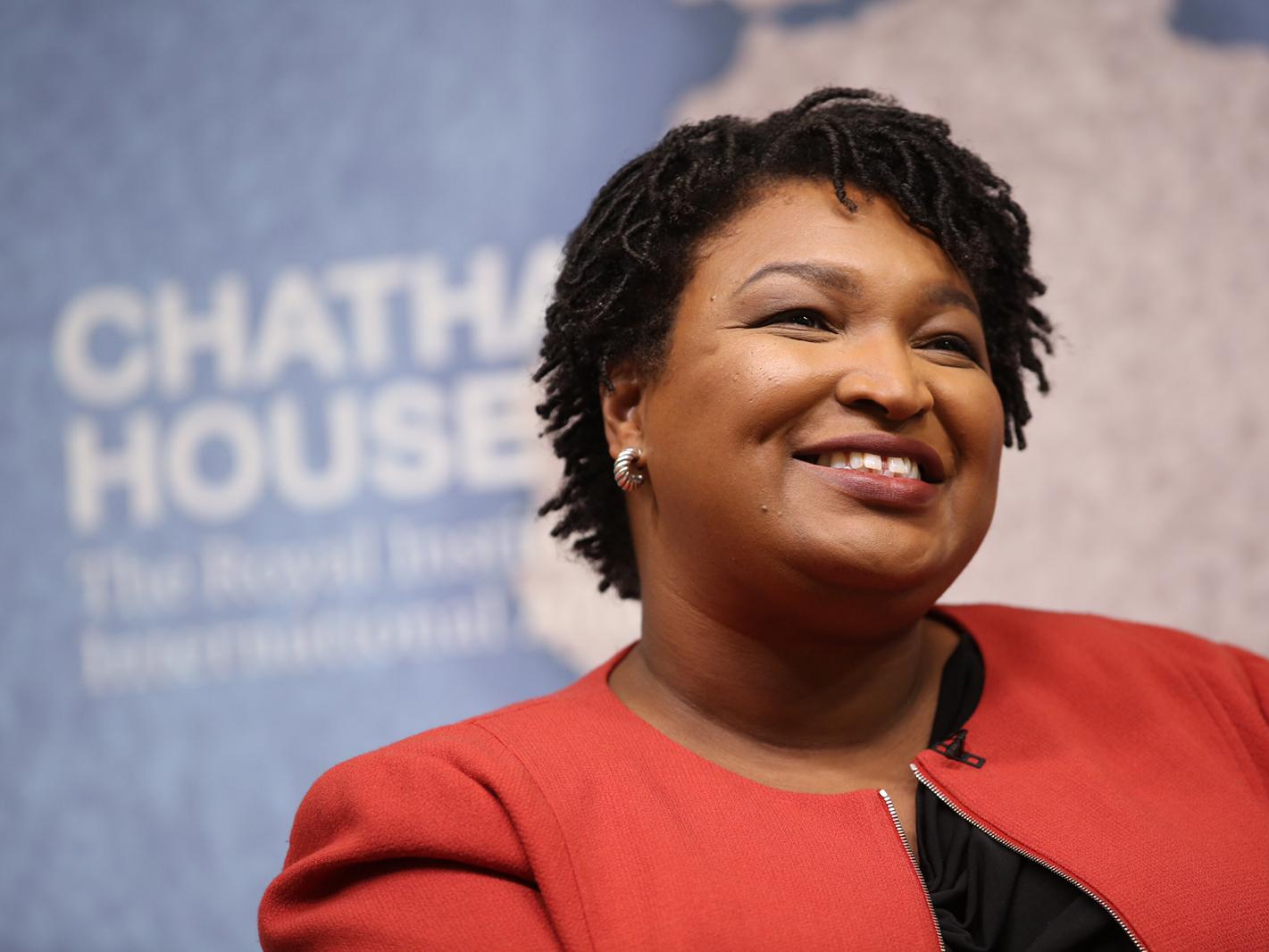- Speaking in London Wednesday, Stacey Abrams laid out the tactics that saw Democrat rocket in Georgia’s race for the governorship.
- Turnout went from 1.1 million to 1.9 million, bringing her within two points of becoming America’s first black female state governor.
- Abrams called for Democrats to embrace “identity politics” and champion marginalized communities.
- She said: “I talked about issues that were normally kept to the side or certainly avoided altogether in the Deep South.”
- Since her defeat, Abrams has emerged as a leading Democrat, delivering the party’s response to Trump’s State of the Union address in February.
Democratic rising star Stacey Abrams broke down the lessons from her race for governor in Georgia, and outlined why she thinks her party must make a radical break from the past to beat President Donald Trump in 2020.
Speaking at London’s Chatham House think-tank on Wednesday, Abrams described how got within 55,000 votes of victory in the historically red state in November’s mid-terms.
Her tactics were a wholesale rejection of Democratic orthodoxy, and the divisive politics President Trump has been accused of waging.

Democrats are fiercely debating how to beat Trump in 2020, with some claiming that a narrow focus on so-called identity politics, or claims for recognition by minority communities, could turn away white voters and lead Democrats into the electoral wilderness.
Some observers claim that Democrats' best hopes lie in addressing the concerns of voters who have deserted them for the Republican Party, such as the elderly and white blue-collar workers.
But Abrams said that the historic high turnout of black, Latino and Asian voters in the state - which nearly got her into office - vindicates her campaign's efforts to reach out and address the concerns of a swath of the electorate usually ignored.
"In our campaign we intentionally centered on people of color and marginalized communities. I proudly proclaimed myself an ally of the LGBTQ community, I talked about issues that were normally kept to the side or certainly avoided altogether in the Deep South," she said.
"Because I believe that people cannot vote for things that do not include them, and cannot be seen unless we speak them into existence."
She said that success will come from in embracing those who usually feel excluded from the political conversation, and giving them a voice.
"What I realised from my campaign - what we realised from the very beginning - is that people want to be seen. They want to be heard. They want to know that their lived experiences are valued and recognised and that the barriers that they face have the possibility of being eroded and moved away.

"They want to know that being a member of a community that is disabled does not mean they are excluded from participation.
She said that she was able to address the needs of diverse communities without alienating white voters - the most common fear of people who reject a focus on identity.
"Not only did we increase the turnout rates of all those communities of colour all those marginalized communities, I actually increased the white participation rate for Democrats for almost 25 years. This is what happens when identity politics takes center stage. All identities are recognised," she said.
"That is why, in our campaign we created opportunities for every single community to have a voice, to be seen and to be heard and to be invested in," remarked Abrams, the first black woman to run as a major party's candidate for state governor in US history.
She said that her campaign was the first to run ads statewide addressing Latino communities, reached out to voters in both rural areas and cities country and urban radio, and tailored its policies for minority communities.
The result: an increase in the Democrat vote from 1.1 million in 2014 to 1.9 million in 2019, including a surge of Latino and black voter turnout.
Abrams lost narrowly to Republican Brian Kemp, whom she accused of abusing his office to purge thousands of Americans from minority communities from voter rolls during his tenure as Georgia's secretary of state.
Kemp has vehemently denied the accusations, and says he was combatting voter fraud. Abrams ended her bid to prevent Kemp taking office in November, and has founded the Fair Fight Action group to combat electoral suppression in the state.
Since the loss, she has emerged as one of the key figures in the Democratic Party, delivering the party's response to Trump's February State of the Union address, where she accused the president of using the government shutdown as a "stunt."

Rumours have swirled that Abrams is considering a 2020 presidential bid, but on Wednesday she steered clear of speculation.
She said which Democrat she backs in 2020 will be down to their stance on voter suppression rather than sexual or ethnic identity.
"I'm not governor in part because of voter suppression," remarked Abrams. "My litmus test is not going to be a litmus test based on race or gender for who is going to be the next nominee for the Democrats - it's going to be whether you talk about voter suppression," she said.
"I would certainly would like to see a woman win, I'm an advocate of people of colour getting in higher and higher positions and to communities writ large, she said.
"We have to talk about voter suppression, because if we did not create space for people to cast their ballots, then our democracy is in trouble. And that is a danger to us all regardless of identity."

